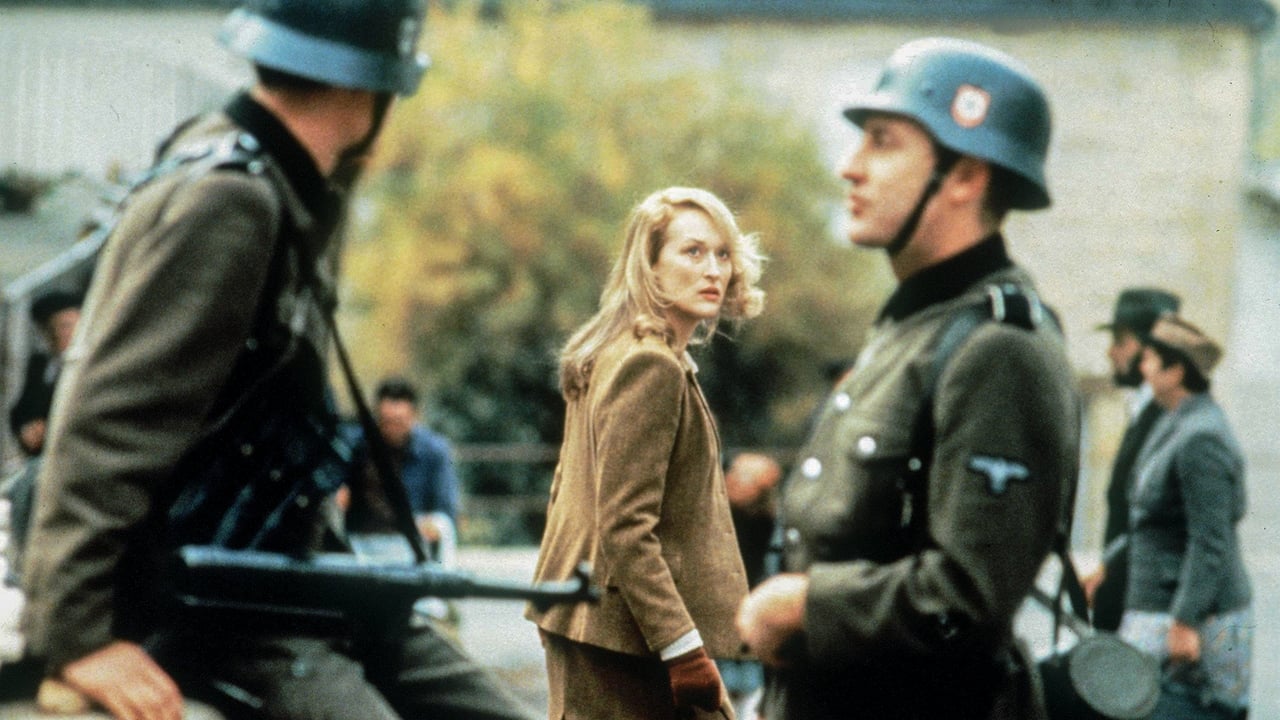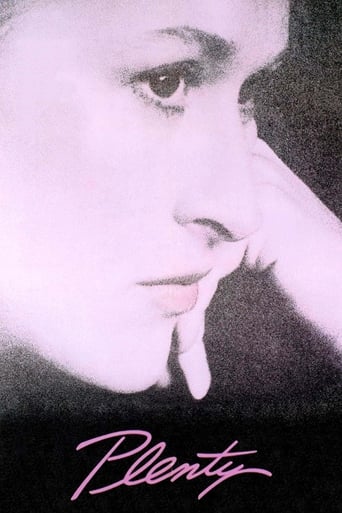



This Movie Can Only Be Described With One Word.
Highly Overrated But Still Good
Excellent and certainly provocative... If nothing else, the film is a real conversation starter.
View MoreThis is a small, humorous movie in some ways, but it has a huge heart. What a nice experience.
View More"Plenty" was adapted for the big screen by David Hare from his stage play of the same name. I haven't seen the play. The film is complex. It is also strangely beguiling (primarily due to the riveting performances of its leading stars) but ultimately less than wholly satisfying. The plot covers a period of twenty years or so after the end of the Second World War. It centres on the life of Susan Traherne (played with subtle brilliance by Meryl Streep), who works in Special Operations in occupied France during the War. While doing so, she has a very brief romantic dalliance with a fellow agent, Lazar (Sam Neill), who parachutes in to assist the resistance against the Nazi occupiers. Their passionate one-night stand (which is all it was) has a deep and lasting impact on Susan, one which essentially haunts her for the rest of her life. A few years after that liaison, Susan meets Raymond Brock (Charles Dance), who works as a junior diplomat in Brussels. He visits her at weekends in post-war London, where she works in a dull administrative job and shares her accommodation with a bohemian girlfriend, Alice (Tracey Ullmann). Desperate to have a child, Susan asks Mick (Sting) to father one with her. Still childless, Susan eventually marries Raymond but her increasingly selfish and neurotic behaviour casts a shadow over his diplomatic career and their marriage. It's a long time since I have seen a film in which all the performances seem to be so good. Streep, Dance and Ullmann are excellent. And there is a first-rate cameo from John Gielgud, who plays a diplomat who resigns his position because of what he considers to be the betrayal and the immoral behaviour of the British government in response to the Suez crisis of the late 1950s. I say the performances "seem" to be top notch for one very good reason. To be able to judge them accurately, the viewer needs to understand everything that is going on. And I have to confess that I am far from sure that I completely follow exactly what the central message of "Plenty" is. Indeed, the remoteness of the film (in terms of its comprehensibility) is a major weakness. I am not at all sure either that I understand why the film has the title it does. I think what Hare is trying to tell us is that the moral values for which people like Susan fought in the Second World War were eventually corrupted by the materialism (the "plenty"?) and the selfishness that were prevalent in the post-war years. But I am by no means sure that that is the message of the film. I suspect that "Plenty" is one of those movies that yields its meaning gradually and therefore necessitates more than one viewing. (I have seen it only the once.)There is one other problem with the film, albeit a minor one. Some of the external scenes, particularly those set in London, seem oddly unconvincing. I think this is because they give the impression of being shot inside a studio rather than outdoors. This tends to give them a somewhat theatrical, as opposed to cinematic, air. But, all in all, a good film. 7/10.
View MoreI was moved by this film. I was aware of Kate Nelligan's performance as Susan Traherne in the original stage version, a lusty, glowing former Resistance heroine with a shattered psyche. In the film, Meryl Streep focused on a beautiful, disarming character's inconsistent control of the crazy energy lurking underneath.Plenty could be re-released today on a double bill with the recently released Brothers. Both show the long-term effects of war, fought overtly and covertly, on combatants and those who love them. It is no secret that the soldier in Brothers wreaks havoc on his family after returning from one tour of duty too many in Iraq. "People with PTSD have persistent frightening thoughts and memories of their ordeal and feel emotionally numb, especially with people they were once close to." So, one way to view and appreciate Susan Traherne and her effect on her husband, friends and co-workers is from this perspective within the context of their cultures.
View MoreThe kid was at a sleepover. Ahhh....for once we could watch a grownup movie. What about that Meryl Streep film I picked up the other day, the one with the glowing accolades on the cover: "one of the greatest performances of her career"... "brilliant"..."fiercely intelligent"... sounds like another "Sophie's Choice"..... but no. It turned out to be a waste of a good evening. After reading many 10-star reviews of this film, I can't help wondering why my husband and I got absolutely nothing out of watching it. It did not engage us in the least. The movie is obviously adapted from a stage play, as the scenes are static and episodic. The transition from one scene to the next is often unclear, as the story jumps ahead in time and moves all over the map. One minute Susan is sharing a cramped flat with her girlfriend; the next minute she is in a comfortable apartment. Now she is dating diplomat Charles Dance. Now she is trying to make a baby with a man she despises - but who bears a marked resemblance to her long-lost airman. But wait - now she is married to Charles Dance. When and why did this happen? (this is not explained until much later in the film).The dinner party scene is awkward and Susan's outbursts (and language) seem out of character. While John Gielgud's performance is delightful (and he has some of the best lines), his relationship with Susan is never really developed - so why is she so upset when he dies? We are great fans of Meryl Streep, but we were puzzled and disappointed by her performance in this film. It was difficult to understand what she was trying to do with her character. Madwoman? Selfish bitch? Disillusioned idealist? Her extreme swings of mood - from passivity to scenery-chewing - were not believable (I do not buy the "bipolar" theory for a minute); nor was her friendship with Tracy Ullman (whose role vacillated between free spirit and wise woman).I found myself longing for "Postcards from the Edge" or "Sophie's Choice" or "Death Becomes Her" or even (God help me) the mess she made of Miranda in "The Devil Wears Prada". At least with these roles you knew where she was going.It has been suggested by several reviewers that the key to liking this film is repeated viewings. Frankly, I am not willing to sacrifice another evening for the experiment.
View MoreThe only opinion I have is my own, and I say that David Hare's PLENTY starring Kate Nelligan was the best Broadway play ever --- and I've seen dozens --- eventually becoming Meryl Streep's best movie.There have been quite a few films that tell of men's difficulty in returning from war unable to fully return home to their mundane life with work and family. In this story, Susan had a truly insignificant role in the French Resistance in World War II; and she briefly had a lover. With the war over, she has a solidly good life in England, married to a fine man, a diplomat, a life with advantages many would envy. IF ONLY... if only she could eradicate her past, if only she could erase her dreams, if only she could find fulfillment in her husband's success rather than her own. Of course many people are shallow enough to do exactly that. Or do they? What secret desires lie in the hearts of each of us? It's easy for the audience to dislike Susan; after all, she pretty well can't stand herself, so why should WE like her, or care about her? Maybe we see a real part of ourselves in her; the part we keep quiet about. Hush! It's my secret. I'd rather you see the smiles.The final few minutes --- which might be real or might be fantasy --- where Susan's long-suppressed dream seems to come full round to reality --- she takes stock of her "fulfillment" drawing the deepest drag on a cigarette, the final expression on her face is inconclusive.What if? What if you could finally cash in your most heartfelt desire? Would you really want the consequence? Think about it!
View More